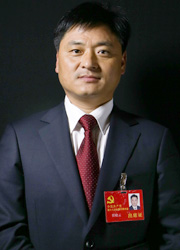|
 |
|
MODEL WORKER: Ren Xiaoyun is one of the 26 migrant workers elected as delegates to the 18th CPC National Congress (JIN LIWANG) | For 16 years, Ren Xiaoyun, a street cleaner, drove his truck past the Great Hall of the People during his daily waste collection route along Beijing's Chang'an Avenue. Yet he had never entered the political landmark, and for a long time it seemed even more distant than his hometown.
In November, he finally had the opportunity to enter the hallowed hall, and in a capacity that he had never before expected: as a delegate to the 18th National Congress of the Communist Party of China (CPC).
Ren is one of the 26 migrant workers elected as delegates to the landmark meeting. Although they only accounted for 1.14 percent of the 2,270 delegates elected to the congress, they collectively represented more than 158 million migrant workers in China.
Ren, 39, left his hometown in Pingquan County of north China's Hebei Province, in 1996, and has since worked in the Yiqing Co. of the Beijing Environment Sanitation Engineering Group Co. Ltd.
Although Ren has worked in Beijing for 16 years, and was honored as a model worker by the municipal government, he still does not have a Beijing hukou (permanent residence status), nor can he afford Beijing's expensive housing. His wife and 7-year-old daughter still live in his hometown.
Encouragingly, the end to this awkward situation for Ren and millions of people like him seems near as the Party has shown its determination to establish in due course a system for guaranteeing fairness in society featuring, among other things, equal rights, equal opportunities and fair rules for all.
Delivering a report to the congress, the then CPC General Secretary Hu Jintao said, "We should accelerate reform of the household registration system, conduct registration of rural migrant workers as permanent urban residents in an orderly way, and endeavor to ensure that all permanent urban residents have access to basic urban public services."
Changing demands
In 2011, China's urban population exceeded rural population for the first time in history, said a report released by the Chinese Academy of Social Sciences in August. Approximately one fourth of permanent urban residents were migrant workers from the countryside who had resided in cities for more than half a year.
Migrant workers on average have worked in cities for 5.3 years, with 40 percent of them having worked for more than five years, and 20 percent of them having worked for more than 10 years, according to the Development Research Center of the State Council in 2010.
Young migrant workers, born in the 1980s and 1990s, account for a large percentage of all migrant workers. Data from the National Bureau of Statistics show that as of 2011, 39 percent of migrant workers were 30 years old or younger, and 22.7 percent were between 31 and 40.
"Many young people in my hometown have left to work in big cities," Ren said. "Better educated, they expect better jobs, higher incomes as well as a more colorful life, and are more eager to integrate into the city."
At a press conference held on the sidelines of the 18th CPC National Congress on November 12, Yang Zhiming, Vice Minister of Human Resources and Social Security, said that the young generation of migrant workers have different demands and interests than their parental generation.
"While the old generation of migrant workers would like to make money and return to the rural areas for further development, now the new generation would like to integrate into and seek development in cities; the old generation demands to be paid in full, while the new generation demands insurance coverage; the old generation requests better work conditions, and the new generation requests a share of the fruits of development," Yang said.
Recently, China Youth Daily conducted an online survey of 10,365 young migrant workers in their 20s or 30s across the country. The study showed that 60.2 percent of the respondents aspired to become urbanites within 10 years. In their eyes, to become urban residents means receiving equal pay for equal work, being covered by the urban social security system and owning real estate in cities.
| 